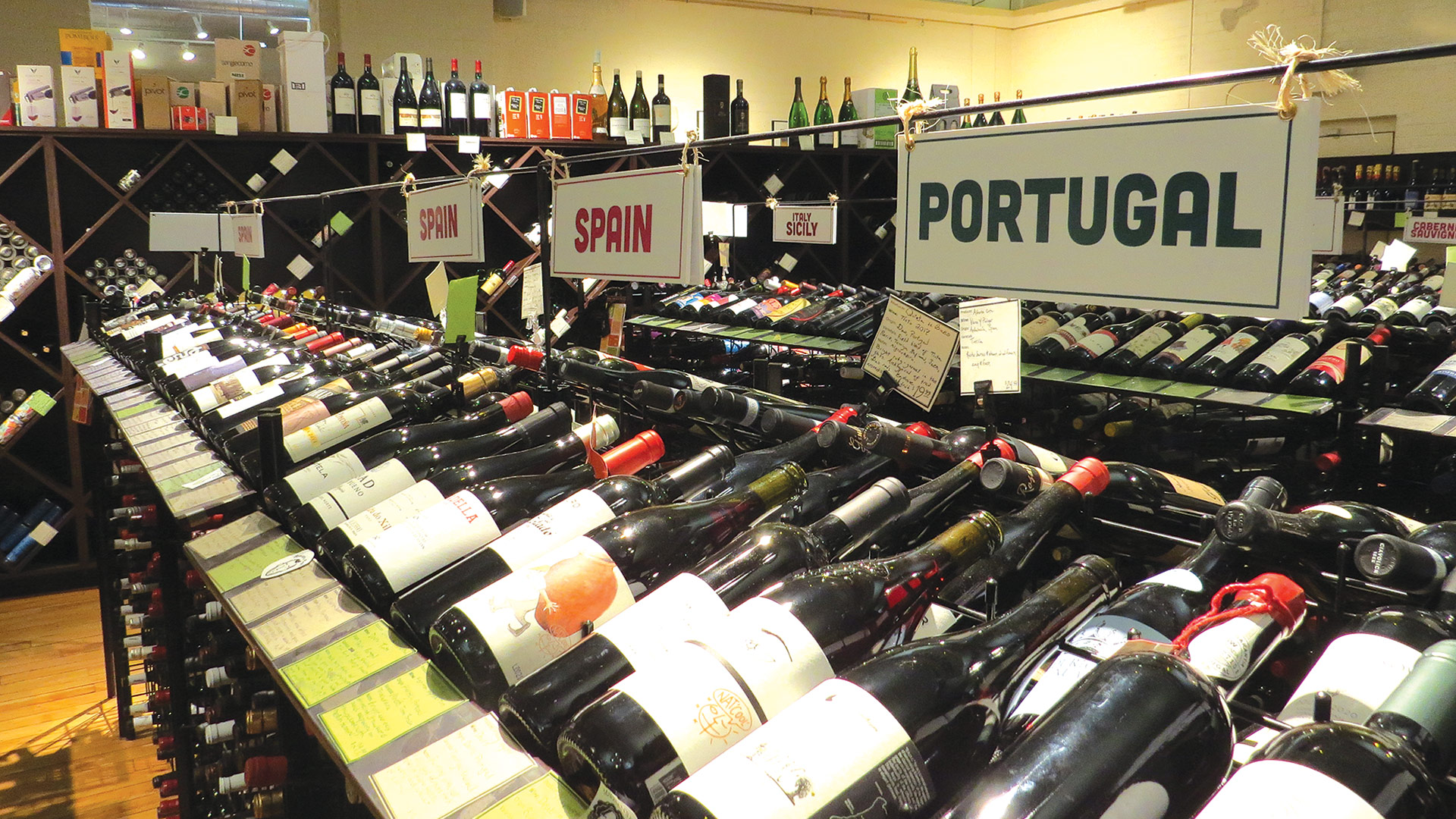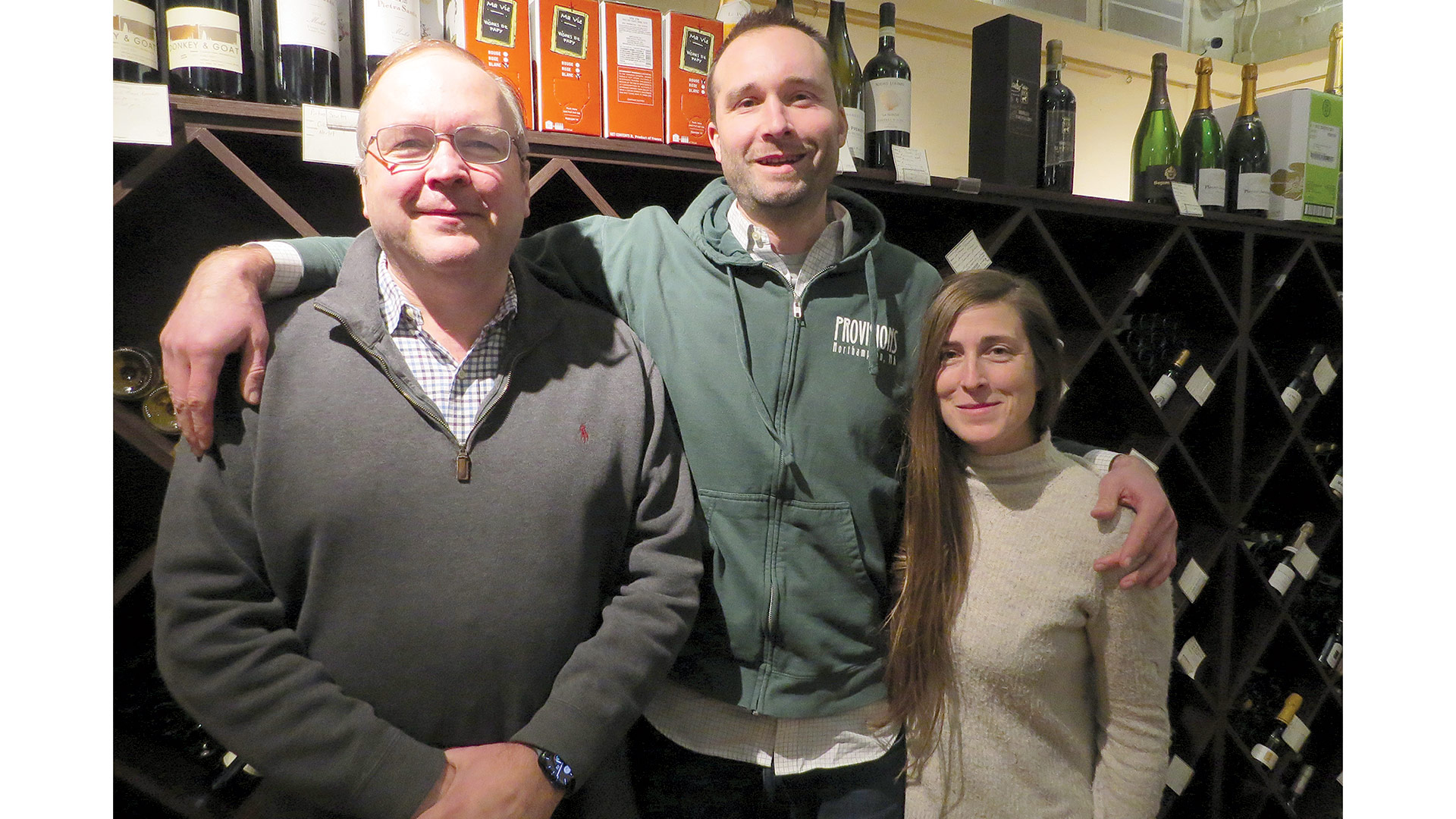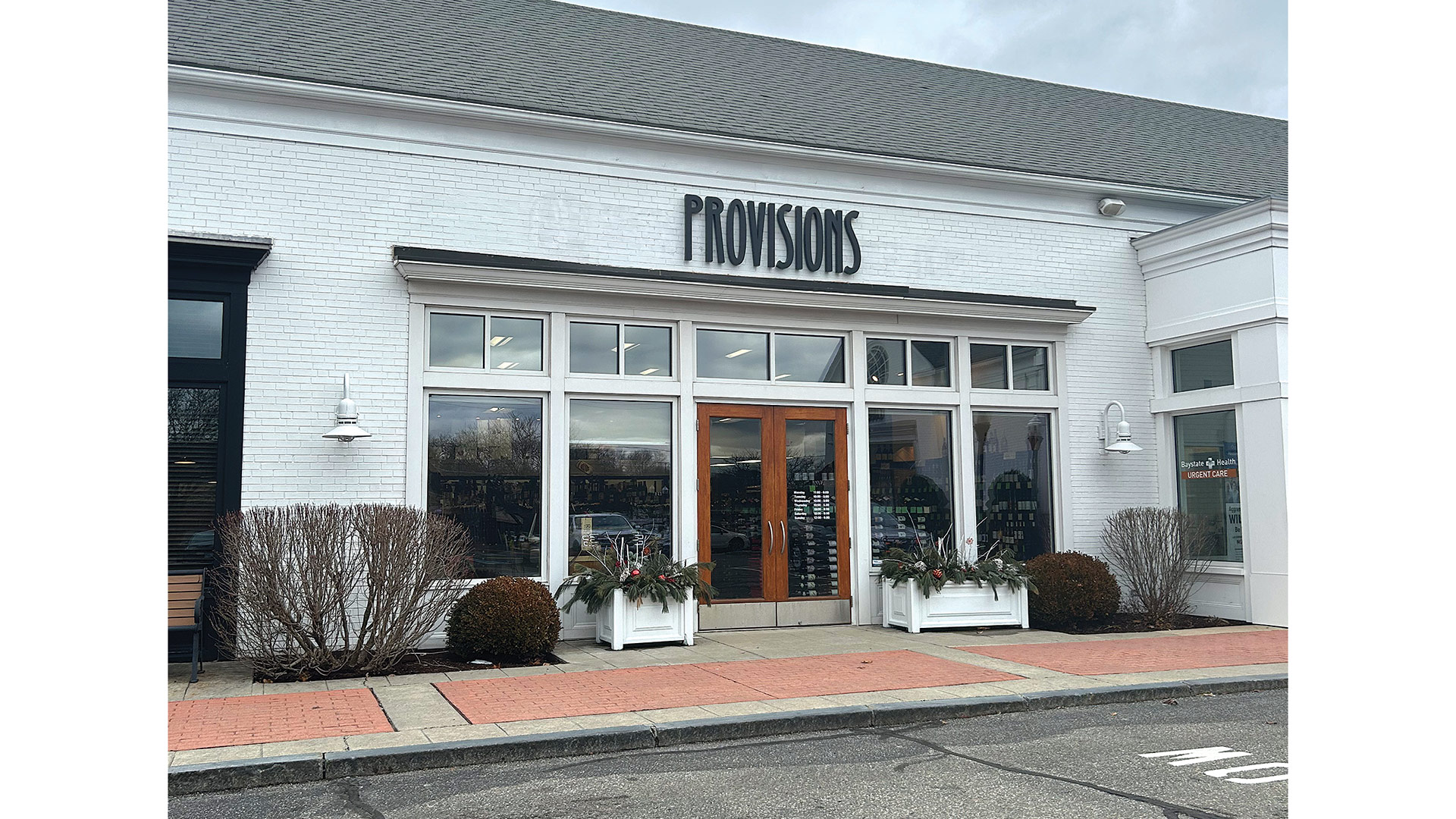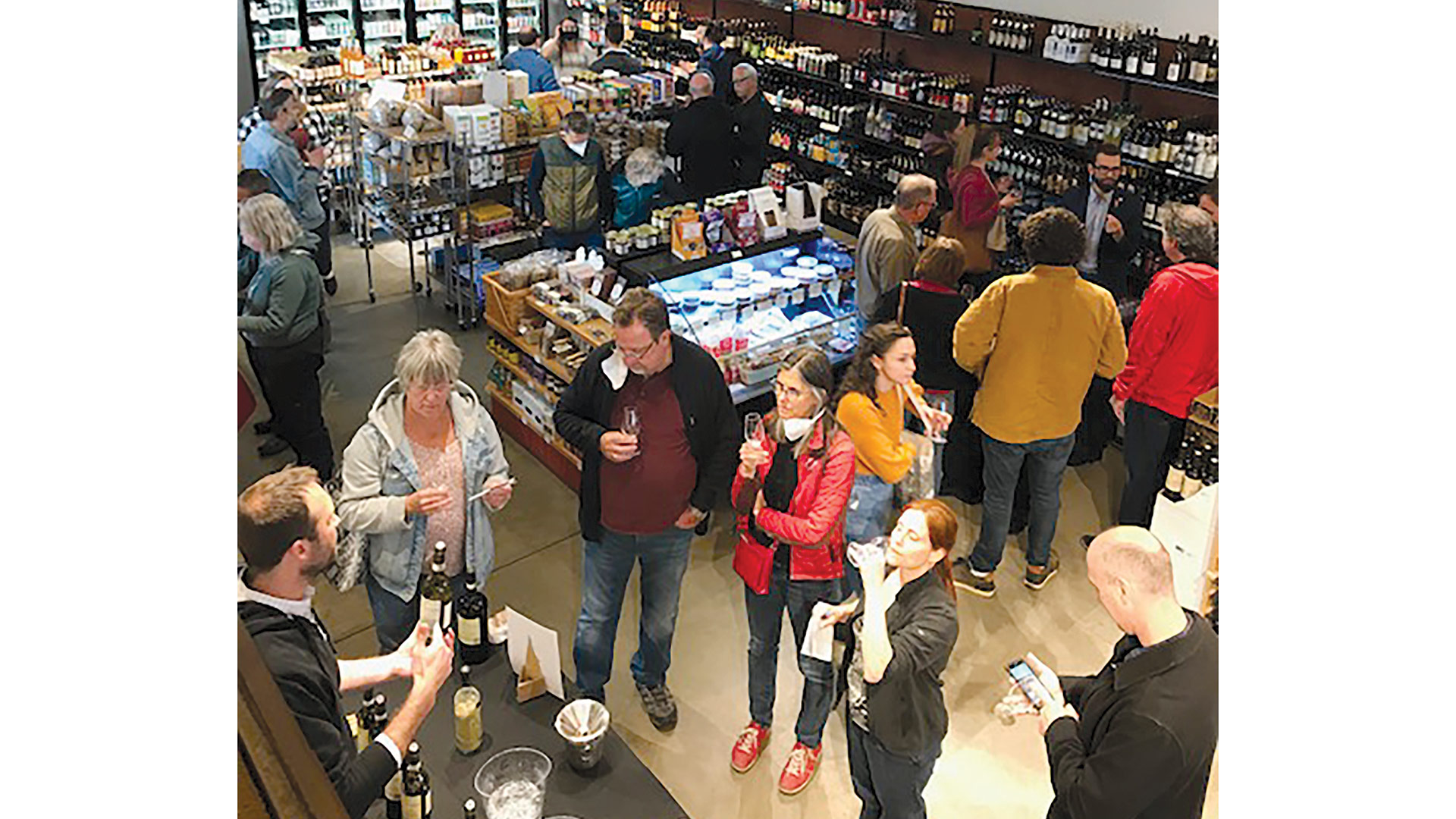Benson Hyde and Bruce McAmis Make Provisions a Regional Success Story

Bruce McAmis, left, and Benson Hyde, co-owners of Provisions
Grape Expectations
Benson Hyde was a financial advisor who wasn’t enthralled with the firm he was working for or the direction his career was headed in.
Bruce McAmis was a lawyer who would have preferred to be doing … well, just about anything else.
That was years ago. In the intervening time, let’s just say their paths crossed (we’ll fill in the details later), and they are now co-authoring one of the more intriguing entrepreneurship stories unfolding in the region.
It’s called Provisions, a wine, cheese, and much-more store that now has three locations: in Northampton, where it all started, in Amherst, where the plot thickened, and, most recently, Longmeadow, where it thickened even more, with the opening of a location in the Longmeadow Shops just before the holidays. They would have preferred to open sooner, but … well, that’s part of the story.
Indeed, expansion has come quickly — more quickly than they anticipated when they first drafted a business plan that has been revised several times already — because opportunities have presented themselves. Seizing them hasn’t been easy, but they’re managing to take a promising concept and run with it, even in the middle of a pandemic, as we’ll see.
The concept? Hyde described it in a number of ways, but maybe this one works best: “people like to talk about fine wine; we like to say we’re all about fun wine.”
By that, he and McAmis meant wine that comes with stories, products produced in ways that resonate with a younger audience that is embracing wine perhaps more than generations before them.
“Our focus is on smaller producers with a story,” Hyde said, “and being able to provide service on a personal level — when someone walks in the store and wants a recommendation, or wants to hear about where a wine came from, or wants a pairing suggestion and an idea for what would make a great gift.”
“People like to talk about fine wine; we like to say we’re all about fun wine.”
Of course, this story is about more than wine. It’s also about cheese — or cheeses, to be more precise. It’s also about spirits of all kinds now. It’s also about making connections with customers and the community, and educating people about wine, not just selling it by the bottle or case.
And, of course, it’s about entrepreneurship and two people settling into that role after working for others and not really enjoying it, and desiring something else.
McAmis and Hyde look the part, and they also sound the part, using words and phrases that anyone who has gone into business for themselves — especially over the past several years — would use.
“It’s been quite a ride … high highs and low lows; it’s been an incredible learning experience,” said Hyde as he talked about everything from accelerated expansion to coping with a pandemic that forced them to find new ways of doing business and had both of them venturing out to make deliveries themselves.
McAmis echoed those thoughts as he talked about their venture. He actually uttered the words “it’s been fun,” and then retracted the statement. Well, sort of. He said it’s occasionally been fun, but mostly it’s been a stern challenge, one that has tested them in all kinds of ways.

The Provisions owners aim to satisfy an evolving market when it comes to how people buy wine, and who is buying it.
“I love it … I rarely, if ever, take a whole day off, but that’s part of being an entrepreneur, I guess,” he said. “It’s been intense, but rewarding on many levels.”
For their work to make Provisions a regional story, one with many chapters still to be written, Hyde and McAmis have been named BusinessWest’s Top Entrepreneurs for 2022. They continue a tradition of entrepreneurship in this region that goes back more than 300 years, and they join a distinguished list of previous winners of this award.
That list includes a college president, a hospital administrator, a public utility, the founders of several tech startups, many family-owned ventures, and several individuals and partnerships like the one forged by McAmis and Hyde.
For this issue, BusinessWest tells their story and, in the process of doing so, explains why they are more than worthy of this coveted honor.
Vintage Undertaking
They call it the ‘Provisions Dungeon.’
That’s the name affixed to the basement of the Northampton location, on Crafts Avenue.
And the name fits. It’s a large, cavernous space with several rooms of various sizes, all of them now crammed with wine and other products sold upstairs. The main area off the stairs was once a classroom where experts on wine passed on their knowledge to diverse audiences eager to learn more about this far-reaching, truly global subject. Now, that space has been given over to racks holding a wide array of spirits, with the classes held at the Amherst location.
“One of the important traits we’ve shown over the years is being responsive to what we’re facing. Whether it’s having to reshape everything because of the pandemic or with growth, it’s a matter of staying aware and staying flexible, and leaning into opportunities.”
Because the main floor is somewhat cramped, with little if any room for inventory, employees are constantly going back and forth to the basement, McAmis noted.
“We almost need to have extra staff on hand because everything that needs to be restocked is in the basement, and that means a lot of carrying cases of wine up the stairs,” he said, adding that the dungeon, where we talked with the two partners, is just one of the more colorful aspects of this evolving business.
Our story starts roughly 12 years ago, said Hyde, at one of the many dinners he enjoyed with his cousin, Alex Feinstein, founder of GoBerry, the recently closed frozen-yogurt store in downtown Northampton, and his wife.

From left, Bruce McAmis, Benson Hyde, and Hyde’s wife, Toni DeLuca, also the company’s wine and spirits buyer.
“He and I had become very close in the Boston area … he and his wife would cook me dinner, and I would bring the wine,” Hyde recalled. “When they got to Northampton, he called me up and said, ‘they could use a good wine shop downtown.’
“I was working in financial services for a company that I wasn’t thrilled to keep working for, so it was pretty easy to twist my arm and talk me into moving out here,” he went on. “I was inspired by his foray into small business.”
In collaboration with the Feinsteins and two other partners, Gordon Alexander and Nancy Baker, he opened Provisions on Crafts Avenue in November 2011. One of the first wine vendors he worked with was McAmis, who, as noted earlier, had a law degree but decided he didn’t want to make that his career. Instead, he ventured into the liquor-wholesaling business with a venture called Yankee Distribution.
After three years in business, Feinstein and Hyde were the remaining partners in the venture, and in late 2019, McAmis bought out Feinstein and became Hyde’s partner in Provisions.
“I thought that we could really grow the business and take some next steps,” said McAmis, adding that he became intrigued by the possibilities — and by Hyde’s determination to take the venture to the next level and scale up.
Those plans started to materialize quickly, but first — actually, at the same time — the business had to contend with the pandemic, which hit Northampton and its downtown, dominated by restaurants and clubs, extremely hard.
“We stayed open the whole time, but we weren’t open to the public, obviously,” McAmis recalled, adding that, like other ventures of this kind, Provisions relied on pickup and delivery, which constituted new, and expensive, ways of doing business that had to be learned and mastered.
“Main Street was a ghost town,” he said, noting that he was making many deliveries himself, and could see that Provisions, State Street Liquors, and a CVS were essentially the only businesses with lights on in that historically vibrant area.

The new Longmeadow location came about rather unexpectedly and before the partners were really ready, but they jumped on the opportunity.
Overall, the pandemic was a learning experience and test of the partners’ mettle, said Hyde, adding that, while business was brisk — sales ballooned during the pandemic for many different reasons — business was also much more difficult.
“We had to completely pivot our business model and completely rethink how we worked with customers and how we operated the entire store,” he recalled. “It was intense, and we made a lot of mistakes before we eventually got things ironed out.
“We were really lucky because we had attracted a staff that was really committed,” he went on. “I don’t think we could have done it if we didn’t have such a loyal and committed staff — it was extremely hard.”
Case in Point
But at the same time they were enduring the pandemic and its many challenges, the two partners were still thinking about expansion and that proverbial next level.
And, as noted earlier, that expansion has come about more quickly, and more profoundly, than they had anticipated in any version of that business plan, primarily because opportunities presented themselves, and they were determined to take advantage of them.
Previous Top Entrepreneurs
• 2021: Dinesh Patel and Vid Mitta, owners of Tower Square in Springfield
• 2020: Golden Years Homecare Services
• 2019: Cinda Jones, president of
W.D. Cowls Inc.
• 2018: Antonacci Family, owners of USA Hauling, GreatHorse, and Sonny’s Place
• 2017: Owners and managers of the Springfield Thunderbirds
• 2016: Paul Kozub, founder and president of V-One Vodka
• 2015: The D’Amour Family, founders of Big Y
• 2014: Delcie Bean, president of
Paragus Strategic IT
• 2013: Tim Van Epps, president and
CEO of Sandri LLC
• 2012: Rick Crews and Jim Brennan, franchisees of Doctors Express
• 2011: Heriberto Flores, director of the New England Farm Workers’ Council and Partners for Community
• 2010: Bob Bolduc, founder and CEO of Pride
• 2009: Holyoke Gas & Electric
• 2008: Arlene Kelly and Kim Sanborn, founders of Human Resource Solutions and Convergent Solutions Inc.
• 2007: John Maybury, president of
Maybury Material Handling
• 2006: Rocco, Jim, and Jayson Falcone, principals of Rocky’s Hardware Stores and Falcone Retail Properties
• 2005: James (Jeb) Balise, president of Balise Motor Sales
• 2004: Craig Melin, then-president and CEO of Cooley Dickinson Hospital
• 2003: Tony Dolphin, president of Springboard Technologies
• 2002: Timm Tobin, then-president of
Tobin Systems Inc.
• 2001: Dan Kelley, then-president of
Equal Access Partners
• 2000: Jim Ross, Doug Brown, and Richard DiGeronimo, then-principals of Concourse Communications
• 1999: Andrew Scibelli, then-president
of Springfield Technical Community College
• 1998: Eric Suher, president of E.S. Sports
• 1997: Peter Rosskothen and Larry Perreault, then-co-owners of the Log Cabin Banquet and Meeting House
• 1996: David Epstein, president and co-founder of JavaNet and the JavaNet Café
The first such opportunity came on King Street in North Amherst, with the opening of Bottle-O, what McAmis described as “an easy, in-and-out beer and wine store where you can grab some cheese.”
As for the expansion of Provisions, the two partners had long targeted Amherst and Longmeadow as the most logical communities to take their concept, and they started with the former, primarily because opportunities in Longmeadow are harder to come by.
Specifically, they started in North Amherst and the emerging Mill District, for which Cinda Jones, architect of that ambitious undertaking, became another of BusinessWest’s Top Entrepreneurs three years ago.
When Atkins Farms decided to leave its space in the sprawling mill complex, Jones approached Benson and McAmis about taking that square footage. They did, recognizing an opportunity to take the brand to a new area and a site that is rapidly becoming a destination because of its array of shops and eateries.
The Amherst location opened in November 2020, still the height of the pandemic, and there have been some growing pains due to COVID, the emerging nature of the Mill District, and the fact that the complex is somewhat off the beaten path.
“It’s taken a little bit of time for word to get out that we’re there,” McAmis said. “But we are growing; we’re seeing green shoots.”
Hyde agreed. “We believe in their vision; they have created a really cool space there,” he said, adding that a planned move to another location at the Mill District, amid an emerging ‘food cluster’ at the complex — with a brewpub envisioned for the space they’re currently occupying — will generate even better results.
As for the Longmeadow location, McAmis said it came about through some “dumb luck.”
Indeed, a space in the Longmeadow Shops next to Max’s restaurant became available, and McAmis noticed the listing while doing a random search for space in Longmeadow last spring.
“As soon as we walked in there, we realized that it was well-suited for what we were looking for,” he told BusinessWest, adding that, while the timing was not exactly ideal because of everything else they were dealing with, they decided to press ahead and get it done, knowing that such opportunities — in that town and in that location — do not come about often.
“Longmeadow happened maybe a year or two sooner than it would have in a perfect world,” he said, noting that the partners were still engrossed in making the North Amherst location work. “It just felt like a bit of a rush to us to contemplate that, but we also didn’t think we would get a better opportunity; not only is it in the Longmeadow Shops, it’s right in the heart of it — so we went ahead. And now that it’s open, I’m happy it’s open.”
Hyde agreed. “The consequences of not taking that spot were huge; I don’t think we would ever have found something that ideal,” he said, adding that the location is close to East Longmeadow and Northern Connecticut, providing an opportunity to introduce the Provisons brand to some new customers.
Taste of Success
When asked what might come next for Provisions, Hyde and McAmis looked at each other, laughed, and offered a collective sigh.
The body language and sound effects made it clear that they’re not contemplating additional expansion at this time, and are instead focused on settling in — in every aspect of that phrase.
Elaborating, they said they want to put their new locations on solid ground, build the brand, and, well … keep doing what they’ve been doing all along.
Specifically, this means listening to customers, responding to what they’re saying, and providing an overall product that is in many ways as distinctive as the various bottles and cheeses on the shelves.
“One of the important traits we’ve shown over the years is being responsive to what we’re facing. Whether it’s having to reshape everything because of the pandemic or with growth, it’s a matter of staying aware and staying flexible, and leaning into opportunities,” said Hyde, adding that this operating mindset has served the partners well to date, and it will continue.
“The focus is going to be less on expanding our footprint in the near term, and more on expanding services and making connections within the community,” he went on. “What’s important to both of us is that we not only have a good business, but our business is part of the community; we support our community, and our community supports us.”
Meanwhile, the partners plan to continue with that theme of providing not just fine wine — they do that as well — but also ‘fun’ wine and products with compelling stories.
And while doing so — and this is perhaps the most rewarding part — they’ve earned the trust of customers.
“That’s been a cool thing — developing those relationships, getting to know people’s palates, and building that trust,” Hyde said. “People will call up and say, ‘I trust you … pick out 12 bottles for me, and I’ll come pick it up.”
That’s an example of that flexibility he described, and being responsive to what a changing audience wants and needs in a bottle of wine and the store that will sell it.
“How people shop for wine has changed, and who is shopping for wine has changed,” he expained. “There are more young people interested in wine these days than when we first opened.”
McAmis agreed. “They’re younger, and they’re interested in learning about the products; it doesn’t have to be a lot of money, but there’s an emphasis on quality, not quantity,” he noted. “We have wines that come from family-owned estates and are natural or biodynamic, organic or sustainably grown — these are all important attributes for a lot of these younger consumers.”

Wine tastings, such as this one at the location in the Mill District in North Amherst, are one way the company focuses on education and engaging its customers.
These attributes and others are explained at the wine classes staged at the Amherst store, said Hyde, adding that education remains a big part of the equation at Provisions.
“There’s usually a theme to these classes,” he explained. “We’ll take people to a region, for example; it’s everything from ‘Wine 101’ to how you taste wines, to deep dives on regions or grades or producers.”
Such classes — and tastings — continued through the pandemic via Zoom, he said, noting that producers brought attendees into their operations virtually. “Having that actual producer in their winery talking about the wine is a cool way to experience it,” Hyde said, adding that the partners are looking to add more of these types of presentations in the future.
“Generally, we want to keep our eyes and our ears open to what people are wanting, what spaces we can fill, and how we can keep ourselves different from the bigger package stores,” he went on. “We do have a big selection, but we’re geared more toward service than having a ton of product; we have well-chosen, curated, thoughtful, fun products.”
Such an attitude explains not only why these two are successful, but why they are BusinessWest’s Top Entrepreneurs for 2022.








